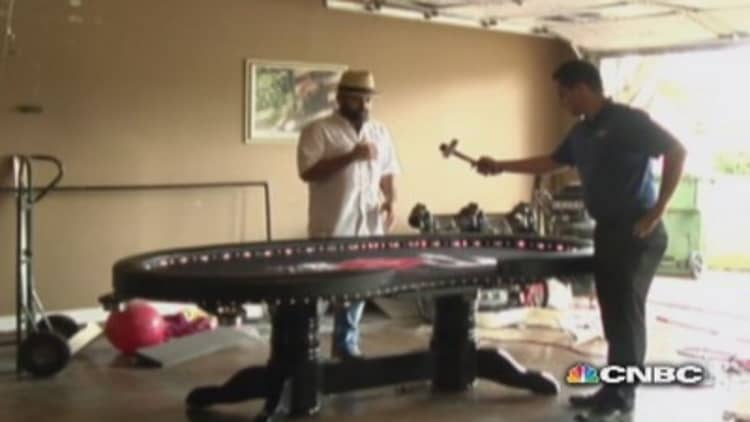On Tuesday night in Las Vegas, 23-year-old Daniel Colman won the World Series of Poker's "Big One for One Drop" Tournament and its $15.3 million first prize. But according to the Las Vegas Sun, he's only going to keep 10 percent of that money—or less.
That's because Colman, and most of the other poker pros in the tournament, had "backers" or investors, giving them the money for the $1 million tournament entry, or buy-in, in exchange for a cut of the winnings.
Forty-two players put up a million dollars each, with $111,111 of every entry going to the charity, 1Drop, which seeks to provide clean drinking water to people across the world.
Billionaire hedge fund manager David Einhorn probably entered with a million dollars of his own money. He lasted about 45 minutes before he was knocked out.
Even Daniel Negreanu, one of the best known and most successful players, with $22 million in career earnings, took to Twitter to sell pieces.
"I'll be selling 50% of my action for The One Drop $1 million buy in this year. Get at me if you want to buy a piece. $5k minimum," Negreanu wrote.
Negreanu finished second for a prize of $8.3 million, a pretty good return for his backers.

Vanessa Selbst, the only woman in the event, told pokernews.com "I definitely do not have all of myself, I'm not that sick in the head. But I have investors here and there, and I just hope to make them proud."
Why do they do it? It's just bad bankroll management to put up a such a large chunk of your money for one tournament. Normally a player would never spend more than 1 percent of his poker bankroll on a tournament entry. That means you would need $100 million on hand to make playing this tournament a wise expenditure.

While not overexposing oneself to financial loss makes perfect sense, there are other reasons players sell action as well. For instance, to reduce "variance," a fancy word for luck. By buying or swapping pieces of several players, it reduces the chance of losing hundreds of thousands of dollars on one bad card.
It's also fun. Players like to trade with their friends so they'll have a "sweat" once they've been eliminated from the tournament, or even if they didn't enter at all.
The thing you need to know about selling pieces is that everyone does it. Nearly all the big pros you see on TV winning millions of dollars will have to split their prize money with investors (and send them a tax form for it).
But it's very rarely talked about in public because it's a lot cooler to see one guy standing behind a huge pile of money than 10 guys behind 10 smaller piles.
—By CNBC's Paul Amin



